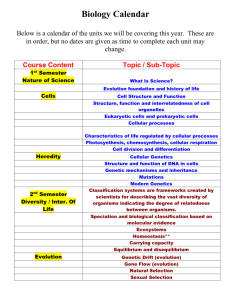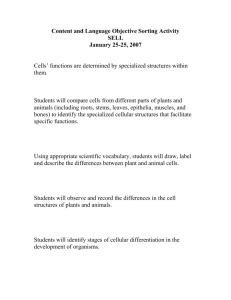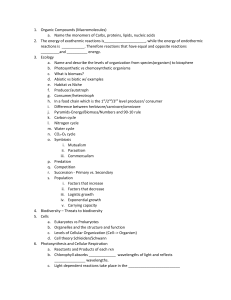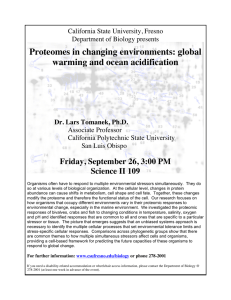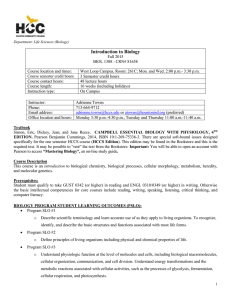HCCSyllabus Spring16.doc
advertisement
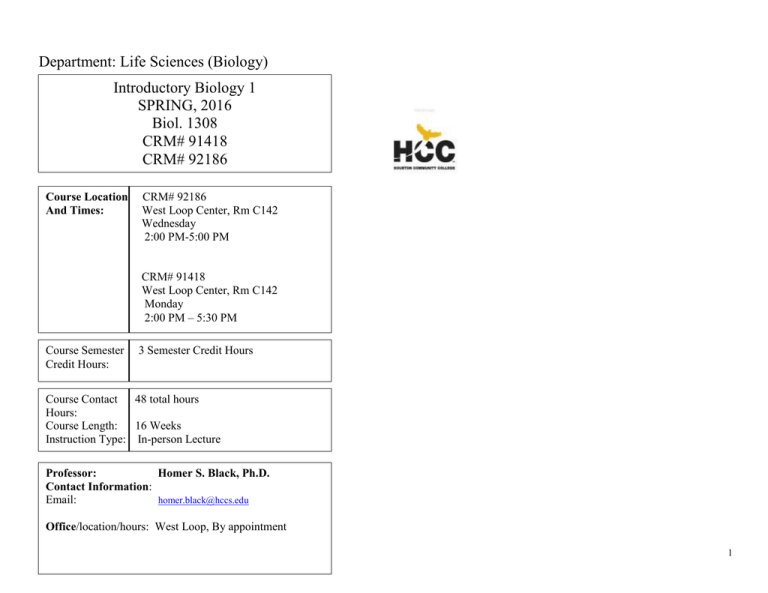
Department: Life Sciences (Biology) Introductory Biology 1 SPRING, 2016 Biol. 1308 CRM# 91418 CRM# 92186 Course Location And Times: CRM# 92186 West Loop Center, Rm C142 Wednesday 2:00 PM-5:00 PM CRM# 91418 West Loop Center, Rm C142 Monday 2:00 PM – 5:30 PM Course Semester Credit Hours: 3 Semester Credit Hours Course Contact 48 total hours Hours: Course Length: 16 Weeks Instruction Type: In-person Lecture Professor: Homer S. Black, Ph.D. Contact Information: Email: homer.black@hccs.edu Office/location/hours: West Loop, By appointment 1 Learning Web Life Sciences Department: http://learning.swc.hccs.edu/ HCC SW learning Web In addition, there is a new Departmental resource website. Textbook Simon, Eric, Dickey, Jean, and Jane Reece. CAMPBELL ESSENTIAL BIOLOGY WITH PHYSIOLOGY, 4TH EDITION. Pearson Benjamin Cummings, 2014, ISBN 10:1269-75336-3. There are special soft-bound issues designed specifically for the one semester HCCS course (HCCS Edition). This edition may be found in the Bookstore and this is the required text. It may be possible to “rent” the text from the Bookstore. Important: You will be able to open an account with Pearson to access “Mastering Biology”, an on-line study guide. Useful Study and Test Taking Web Sites http://www.studygs.net http://www.how-to-study.com/ Course Description This course is an introduction to biological chemistry, biological processes, cellular morphology, metabolism, heredity, and molecular genetics. Prerequisites: Student must qualify to take GUST 0342 (or higher) in reading and ENGL 0310/0349 (or higher) in writing. Otherwise the basic intellectual competencies for core courses include reading, writing, speaking, listening, critical thinking, and computer literacy. BIOLOGY PROGRAM STUDENT LEARNING OUTCOMES (PSLO): This section defines the areas of study for which you will be responsible. Program SLO #1 Describe scientific terminology and learn accurate use of as they apply to living organisms. To recognize, identify, and describe the basic structures and functions associated with most life forms. Program SLO #2 Define principles of living organisms including physical and chemical properties of life. Program SLO #3 Understand physiologic function at the level of molecules and cells, including biological macromolecules, cellular organization, communication, and cell division. Understand energy transformations and the metabolic reactions associated with cellular activities, such as the processes of glycolysis, fermentation, cellular respiration, and photosynthesis. Program SLO #4 – Understand the molecular sequence of events involved in the flow and expression of genetic information in prokaryotic and eukaryotic cells, with special emphasis on the understanding of DNA replication, RNA transcription, and protein biosynthesis. 2 Program SLO #5 – Understand the basic concepts of Mendelian genetics, perform and interpret genetic problems. Describe advances made in the understanding of chromosomes, genes, and nucleic acids that form the basis of modern molecular genetics. Program SLO #6 – Apply scientific method by asking a question, observing, developing and testing an hypothesis by experiment, collecting and writing organized reports. Develop critical thinking and distinguish theory from an hypothesis. STUDENT LEARNING OUTCOMES (SLO): The following Student Learning Outcomes with their associated assessment criteria are not meant to be all inclusive, and are meant to be used along with all other course learning outcomes and assessment devices, listed under Course Objectives, in the determination of the student's final course grade. Completion of the specific Student Learning Outcomes listed below, at any assessment grading level, does NOT and will NOT guarantee the student that final course grade at the end of the semester! Bio 1308 SLO#1 The student will be able to recognize and describe, in scientific terminology, the basic structure and describe the function of eukaryotic and prokaryotic cellular organelles and cell systems. PSLO #1 Bio 1308 SLO#2 The student will be able to define the physical and chemical principles and their manifestation in living organisms. a. the properties of elements, atoms, sub atomic particles. b. the attraction of chemical bonds c. the properties of molecules, compounds d. the nature of strong and weak chemical bonds, and how special properties are conveyed through polar attractions. PSLO #2 Bio 1308 SLO#3 The student will be able to explain the synthesis and properties of a. carbohydrates b. lipids c. proteins c. nucleic acids d. Cell organization and the cell theory e. Understand energy transformation , e.g., fermentation, cellular metabolism, and photosynthesis 3 f. Understand the processes of asexual and sexual cell division PSLO #3 Bio 1308 SLO#4 The student will understand the molecular sequence of events in the flow and expression of genetic information, in both prokaryotic and eukaryotic cells. a. transcription b. translation PSLO #4 Bio 1308 SLO#5 The student will understand the basics of Mendelian genetics and modern molecular genetics. a. work problems involving dominance, recessiveness, co-dominance, and incomplete dominance. b. understand the principles of chance c. understand the principles and steps involved in constructing recombinant organisms in genetic engineering. PSLO #5 Bio 1308 SLO#6 The student will demonstrate the ability to solve problems through the application of the scientific method. Will develop those critical thinking skills that will allow the student to sift fact from fiction without being swayed by emotional testimony or political spin. PSLO #6 Course Objectives (Text pages 1- 234) 1. Introduce students to modern concepts of biology. 2. Introduce students to the chemical and molecular basis of life. 3. Introduce students to the intricate levels of molecular mechanisms that manifest life, i.e., respiration, photosynthesis, heredity. Successful completion of this course should provide the student with a good introduction to biological sciences and a grasp of biological principles that will allow them to function as knowledgeable and informed citizens in a Society that demands a greater sophistication in the modern sciences, particularly as they pertain to molecular technology, forensic and judiciary matters, environmental, and medical issues. CORE CURRICULUM STATEMENT: Lecture exams and class activities will enhance the learning process by giving the student the opportunity to demonstrate the basic intellectual competencies of reading, writing, speaking, listening, and showing critical thinking and problem solving ability. *General Course Content and Calender Continued 4 GENERAL COURSE SCHEDULE Lecture and Exam Week 1 First day of class – Class Organization. Chap. 1, Introduction: Biology Today Week 2 Chap. 2, Essential Chemistry for Biology Week 3 Chap. 3, The Molecules of Life Week 4 Chap. 4. A Tour of the Cell Week 5 Exam I (Chaps 1-3): Chap. 5. The Working Cell Week 6 Chap. 6. Cellular Respiration: Obtaining Energy from Food Week 7 Chap. 7. Photosynthesis: Using Light to make Food Week 8 Exam II (Chaps 4-6): Chap. 8. Cellular Reproduction: Cells from Cells Week 9 Chap. 9, Patterns of Inheritance Week 10 Spring Break Week 11 Chap. 10. The Structure and Function of DNA Week 12 Exam III (Chaps 7-9): Chap. 11. How Genes are Controlled Week 13 Chap. 12. DNA Technology Week 14 Instructional Pad Week 15 Exam IV (Chaps 10-12), Course Overview and Review Week 16--------------------Instruction Ends------- --------------------------------------------FINAL EXAMInstructor reserves the right to revise this schedule should it become necessary. *See the Class schedule on the Learning Web for the topics (listed by chapter title) and specific dates that will be covered in this class. 5 HCC Statement Policies: Attendance Policy Class attendance is required. The HCCS attendance policy is stated in the Schedule of Classes: “Students are expected to attend classes regularly. Students are responsible for materials covered during their absences, and it is the student's responsibility to consult with instructors for make-up assignments. Class attendance is checked daily by instructors. Although it is the responsibility of the student to drop a course for non-attendance, the instructor has full authority to drop a student for excessive absences. A student may be dropped from a course for excessive absences after the student has accumulated absences in excess of 12.5% of the hours of instruction (including lecture and laboratory time).” Note that 12.5% is approximately 2 classes for a 3 semester hour course, such as this one. Last Day for Administrative and Student Withdrawals If it should become necessary to do so, the student is responsible for filing a drop slip for the course by the last drop date to receive a grade of “W”, otherwise a grade of “F” will be assigned. For 16 week Spring, 2016 classes, the last drop date is April 05. Please see me before taking this action. However, instructors will no longer be able to assign a “W” for you after that date. You will receive the grade you earn, with no exceptions. New Institutional Policy Students who repeat a course three or more times may face significant tuition/fee increases at HCC and other Texas public colleges and universities. Please ask your instructor/counselor about opportunities for tutoring/other assistance prior to considering course withdrawal, or if you are not receiving passing grades. International Students Receiving a “W” in a course may affect the status of your student Visa. Once a “W” is given for the course, it will not be changed to an “F” because of the visa consideration. Please contact the International Student Office at 713-718-8520 if you have any questions about your visa status and other transfer issues. Disability Support Services (DSS) Any student with a documented disability (e.g. physical, learning, psychiatric, vision, hearing, etc.) who needs to arrange reasonable accommodations must contact the Disability Services Office at the respective college at the beginning of each semester. Faculty is authorized to provide only the accommodations requested by the Disability Support Services Office. For questions, please contact Donna Price at 713.718.5165 or the Disability Counselor at your college. To visit the ADA Web site, please visit www.hccs.edu then click Future students, scroll down the page and click on the words Disability Information. District ADA Coordinator – Donna Price – 713.718.5165 Southwest ADA Counselor – Dr. Becky Hauri – 713.718.7910 Early Warning System You will be asked to provide a telephone number and E-mail address so that you may receive information regarding the type of learning resources and services that are available to you. This information will also be used to direct students to our counselors if an early problem is detected. You may be contacted by an HCC counselor, if needed. You may also call 713-718-7797. Academic Honesty Students are responsible for conducting themselves with honor and integrity in fulfilling course requirements. Disciplinary proceedings may be initiated by the college system against a student accused of scholastic dishonesty. Penalties can include a grade of "0" or "F" on the particular assignment, failure in the course, academic probation, or even dismissal from the college. Scholastic dishonesty includes, but is not limited to, cheating on a test, plagiarism, and collusion. 6 TITLE IX OF THE EDUCATION AMENDMENTS OF 1972, 20 U.S.C. A§ 1681 ET. SEQ. Title IX of the Education Amendments of 1972 requires that institutions have policies and procedures that protect students’ rights with regard to sex/gender discrimination. Information regarding these rights are on the HCC website under Students-Anti-discrimination. Students who are pregnant and require accommodations should contact any of the ADA Counselors for assistance. It is important that every student understands and conforms to respectful behavior while at HCC. Sexual misconduct is not condoned and will be addressed promptly. Know your rights and how to avoid these difficult situations. Log in to: www.edurisksolutions.org . Sign in using your HCC student e-mail account, then go to the button at the top right that says Login and enter your student number. HCC Policy Statement – Sexual Harassment It is a violation of HCCS policy for an employee, agent, or student of the college to engage in sexual harassment as defined in the EEOC guidelines (EEO/AA Compliance Handbook 47). HCC Policy Statement – Safe And Secure Learning Environment It is the policy of HCC to provide a safe and secure environment within which learning can take place effectively. Accordingly, disruptive, threatening, or violent behavior in the classroom will not be tolerated. Disruptive, threatening, or violent individuals will be asked to leave the classroom for that day. Failure to comply with this request may lead to removal and/or arrest by the police. This is in addition to any college disciplinary action to which the individual might be liable. Student Assessment: Exams, Grading, and Make-up Policy All examinations will be based upon a 100% score. Four examinations will be given during the course of the semester. The average of these exams will comprise 80% of the final grade. A comprehensive Departmental Exit exam and the Instructors Final exam, to assess your achievement in the course of instruction, will be given at the scheduled Final Exam date and the average of these exams will account for the remaining 20% of your final grade. The lecture exams are multiple choice, 50 questions each, and will be scored by scantron. You must bring your own scantron answer card and a No.2 lead pencil with clean eraser to scheduled exams. There is no grading curve! However, there will be additional bonus questions on the lecture exams that could enhance your test score by 10 points, an ultimately nearly a letter grade for the semester. Be sure to arrive early for all scheduled exams as these have time limits. Entering and exiting lecture room is not permitted once exams have begun. In general, there are no lecture make-up examinations. In some extreme instances (e.g., medically excused absence, death in immediate family) a make-up exam will be administered and may take either oral or written format. All make-up examinations will have a maximum score of 90% (reduced by 10%) regardless of whether there was a valid reason for missing the scheduled examination. There are no special assignments for extra grade points. This course will adhere to the grading scale as set forth by the College, i.e. A B C D F Excellent Good Average Poor, passing Failing 90-100 80-89 70-79 60-69 below 60 7 The grading scale is directly tied to the Assessment Rubrics that follow. These rubrics describe the level of performance required for each of the designated areas with the respective grading scale. ASSESSMENT RUBRICS INTRODUCTORY BIOLOGY I - BIOLOGY 1308 Performance Factors F 1. Describe scientific terminology and learn accurate use of them in living organisms 2. Define principles of living organisms including physical and chemical properties of life. 3. Understand function at the level of molecules and cells, to include biological macromolecules, cellular organization, communication, and cell division. Understand energy transformations and the metabolic reactions associated with cellular activities, such as the processes of glycolysis, fermentation, cellular respiration, and photosynthesis. Unable to demonstrate knowledge of scientific terminology and its use in living organisms. Unable to demonstrate knowledge of principles of living organisms including physical and chemical properties of life. Unable to explain function at the level of biological macromolecule and cell. Unable to understand energy transformations and the metabolic reactions associated with cellular activities. D Rating Scale C Occasionally able to demonstrate knowledge of scientific terminology, unable to demonstrate its use in living organisms. Occasionally able to demonstrate knowledge of principles of living organisms , unable to demonstrate physical and chemical properties of life. Occasionally able to demonstrate knowledge of scientific terminology, and its partial use in living organisms. Occasionally able to demonstrate knowledge of principles of living organisms and physical and chemical properties of life. Able to explain function at the level of biological macromolecule, Able to explain function at the level of biological macromolecule, Able to explain the cellular organization , but not function Able to explain the cellular organization and function of cell components Unable to explain cell division. Able to explain cell division. Unable to explain energy transformations Unable to explain energy transformations Unable to explain the metabolic reactions Unable to explain the metabolic reactions B Consistently able to demonstrate knowledge of scientific terminology, and its partial use in living organisms Consistently able to demonstrate knowledge of principles of living organisms and partial knowledge of physical and chemical properties of life. Able to explain the function at the level of molecules and cells, to include biological macromolecules, cellular organization, communication, and cell division. Able to explain energy transformations. Unable to explain the metabolic reactions associated with cellular activities, such as the A Consistently able to demonstrate knowledge of scientific terminology, and its complete use in living organisms Consistently able to demonstrate knowledge of principles of living organisms and complete knowledge of physical and chemical properties of life. Able to explain the function at the level of molecules and cells, to include biological macromolecules, cellular organization, communication, and cell division. Able to explain and apply the knowledge of energy transformations Able to explain the metabolic reactions associated with cellular activities, such as the processes of glycolysis, fermentation, cellular 8 4. Explain the molecular sequence of events involved in the flow and expression of genetic information in prokaryotic and eukaryotic cells, with special emphasis on the understanding of DNA replication, RNA transcription, protein biosynthesis and mutation. Unable to explain the molecular sequence of events involved in the flow and expression of genetic information in prokaryotic and eukaryotic cells, with special emphasis on the understanding of DNA replication, RNA transcription, protein biosynthesis and mutation. associated with cellular activities. associated with cellular activities.. processes of glycolysis, fermentation, cellular respiration, and photosynthesis. respiration, and photosynthesis. . Able to explain the molecular sequence of events involved in the flow and expression of genetic information in prokaryotic and eukaryotic cells Able to explain the molecular sequence of events involved in the flow and expression of genetic information in prokaryotic and eukaryotic cells Able to explain the molecular sequence of events involved in the flow and expression of genetic information in prokaryotic and eukaryotic cells Consistently able to explain the molecular sequence of events involved in the flow and expression of genetic information in prokaryotic and eukaryotic cells Able to explain the process of DNA replication Able to explain the process of DNA replication and RNA transcription. Unable to explain RNA transcription, protein biosynthesis and mutation. Unable to demonstrate protein biosynthesis and mutation. Able to explain the process of DNA replication and RNA transcription Able to explain the process of DNA replication and RNA transcription , protein biosynthesis and mutation. Able to demonstrate partial knowledge of protein biosynthesis and mutation. Continued 9 Performance Factors Rating Scale F 5. Understand basic knowledge of Mendelian genetics, perform and interpret genetic problems. Describe advances made in the understanding of genes and chromosomes since Mendel. 6. Apply scientific method of asking a question, developing and testing hypothesis by experiments, collecting and writing organized reports. Develop critical thinking and distinguish theory from a hypothesis. D C Unable to demonstrate basic knowledge of Mendelian genetics, Unable to perform and interpret genetic problems. Unable to describe advances made in the understanding of genes and chromosomes since Mendel. Able to demonstrate basic knowledge of Mendelian genetics, Able to demonstrate basic knowledge of Mendelian genetics, Unable to perform and interpret genetic problems. Less than 50% proficiency in performing and interpretation of genetic problems. Consistently cannot differentiate between appropriate and inappropriate experimental design, in practice or by scenario. Occasionally differentiates between appropriate and inappropriate experimental design, but needs direction to proceed to next step. Unable to describe advances made in the understanding of genes and chromosomes since Mendel. Able to describe advances made in the understanding of genes and chromosomes since Mendel. Consistently differentiates between appropriate and inappropriate experimental design, but needs direction to proceed to next step. B A Consistently demonstrates knowledge of Mendelian genetics, 80% proficiency in performing and interpretation of genetic problems. Able to describe advances made in the understanding of genes and chromosomes since Mendel. Consistently demonstrates knowledge of Mendelian genetics, 100% proficiency in performing and interpretation of genetic problems. Able to describe advances made in the understanding of genes and chromosomes since Mendel. Consistently differentiates between appropriate and inappropriate experimental design. Attempts to perform some appropriate corrective action or explain some appropriate action; needs some assistance from instructor. Consistently differentiates between appropriate and inappropriate experimental design. Takes appropriate steps or explains appropriate steps independently and correctly. Is able to distinguish theory from hypothesis on their own. At Houston Community College, professors believe that thoughtful student feedback is necessary to improve teaching and learning. During a designated time, you will be asked to answer a short online survey of research-based questions related to instruction. The anonymous results of the survey will be made available to your professors and division chairs for continual improvement of instruction. Look for the survey as part of the Houston Community College Student System online near the end of the term. 11 Log into the People Soft system. Enable pop-ups as Smarter Services site opens in a new window. http://www.hccs.edu/EGLS3 *This syllabus constitutes a contract between the instructor or HCC, and the student. The provisions listed above may be changed at any time, either orally or by timely written notification. However, examination and grading policies are firm for any given semester, unless extraordinary or emergency circumstances occur. Your Grade Record Extra Credit (1 pt ea) Syllabus and class schedule EGL3 EXAM I EXAM II EXAM III EXAM IV Avg FINALS Total Exam Points/5 = Final Grade 12
